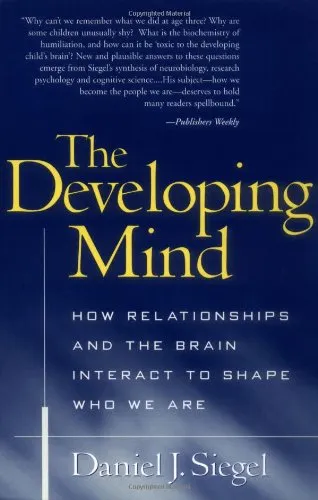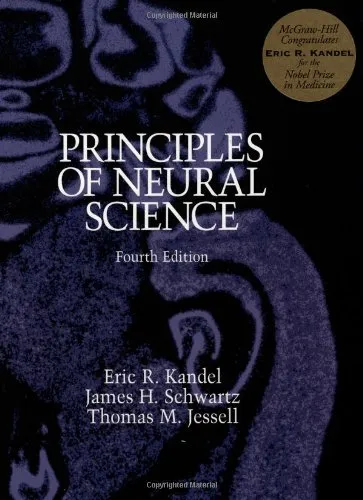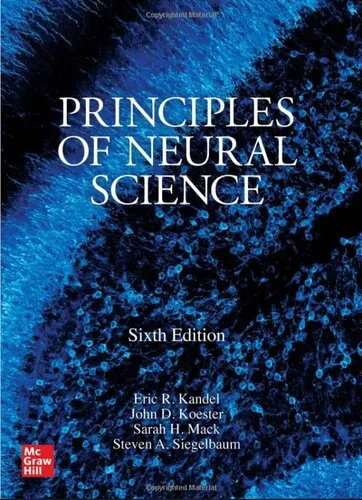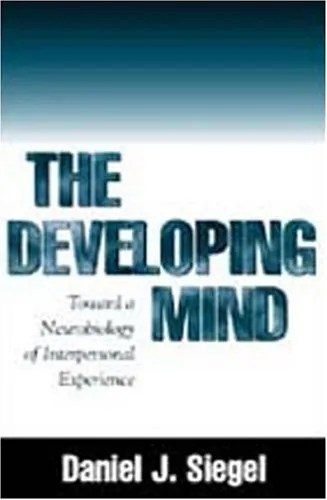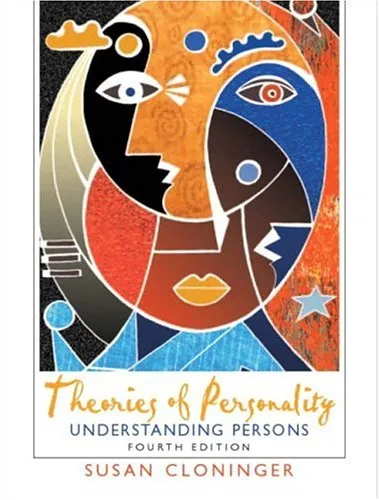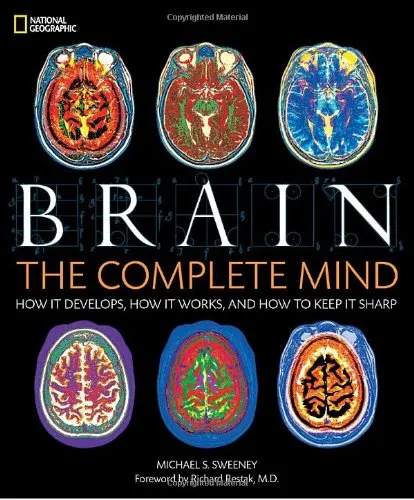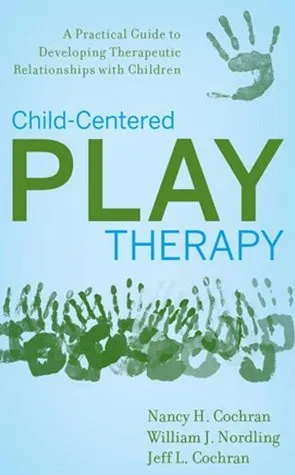The Developing Mind: How Relationships and the Brain Interact to Shape Who We Are
4.8
بر اساس نظر کاربران

شما میتونید سوالاتتون در باره کتاب رو از هوش مصنوعیش بعد از ورود بپرسید
هر دانلود یا پرسش از هوش مصنوعی 2 امتیاز لازم دارد، برای بدست آوردن امتیاز رایگان، به صفحه ی راهنمای امتیازات سر بزنید و یک سری کار ارزشمند انجام بدینکتاب های مرتبط:
معرفی کتاب "The Developing Mind: How Relationships and the Brain Interact to Shape Who We Are"
خلاصه پژوهش کتاب
کتاب "The Developing Mind" بر روی مفاهیم "emotional intelligence" و توسعه "interpersonal neurobiology" تمرکز دارد. دکتر سیگل با استفاده از زبان ساده و شفاف، نقش روابط در توسعه و عملکرد مغز را مورد بررسی قرار میدهد. او توضیح میدهد که چگونه تعاملات اجتماعی اولیه، پیوندهای مغزی را شکل میدهند و در تشکیل الگوهای رفتاری و ذهنی افراد موثرند. در این کتاب، همچنین به چگونگی تأثیر تجارب کودکی بر سلامت ذهنی و کارکرد مغز در طول زندگی پرداخته میشود.
نکات کلیدی از کتاب
- توسعه عصبشناختی: تأکید بر اینکه چگونگی تاثیر روابط بر رشد نورولوژیکی و روانی فرد، اشاره به نقاط قوت نظریه "interpersonal neurobiology".
- اهمیت هوش عاطفی: تشریح اینکه چگونه هوش عاطفی ناشی از تعاملات انسانی میتواند به سازگاری با محیط و بهبود روابط بین فردی کمک کند.
- تجارب اولیه: بررسی اثر تجارب اولیه زندگی و تعاملات اجتماعی در تشکیل ساختارهای مغزی که بر رفتار آینده اثرگذارند.
جملات معروف از کتاب
- "ادراک و روابط انسانی اساس شکلگیری ذهن ما هستند و میتوانند به بازسازی مسیرهای عصبی مغزی منجر شوند."
- "ذهن ما همانگونه توسعه مییابد که ما روابط خود را شکل میدهیم؛ از این رو هر تعامل جزئی، یک حفره اساسی در نحوه اندیشه ما ایجاد میکند."
چرا این کتاب مهم است؟
ارزش کتاب در عمق تحلیل و نگاهی نو به یافتههای علمی درباره مؤلفههای روانی و عصبشناختی روابط نهفته است. این اثر بهعنوان یک پل بین دانش روانشناسی و علوم عصبی، بهخوبی توانسته مخاطبان خود را با پیچیدگیهای ذهن انسانی و نقش روابط در الگوهای رفتاری آشنا کند. این کتاب نهتنها برای متخصصان، بلکه برای هر فردی که به درک عمیقتری از روان انسان و تعاملات اجتماعی علاقهمند باشد، مناسب است.
Welcome to a comprehensive exploration of 'The Developing Mind: How Relationships and the Brain Interact to Shape Who We Are', a seminal work by Daniel J. Siegel. This influential book bridges the gap between neuroscience and attachment theory, providing profound insights into how our relationships influence brain development and ultimately shape who we become. In this introduction, we will delve into the book's detailed summary, key takeaways, memorable quotes, and the significance of Siegel's work in the field of psychology and beyond.
Detailed Summary of the Book
The essence of 'The Developing Mind' lies in its exploration of the intricate interplay between human relationships and brain architecture. Siegel argues that the mind is more than a combination of synapses and neurons; it is deeply intertwined with and shaped by our interpersonal relationships. The book unfolds the concept of the brain as a relational organ, where the lived experiences and emotional connections with others play a pivotal role in the wiring and rewiring of the neural landscape.
Siegel synthesizes cutting-edge research from fields such as neuroscience, psychiatry, and developmental psychology to illustrate how social experiences affect brain structure and function from birth through adulthood. A fundamental premise of the book is the concept of 'interpersonal neurobiology', which refers to the perspective that the brain's architecture is sculpted by interactions with caregivers, peers, and the broader social environment.
The book further offers insight into how early attachment experiences set the groundwork for emotional regulation, empathy, and the ability to form and sustain meaningful relationships. Siegel elaborates on how secure attachments foster a well-integrated brain, characterized by the flexible and adaptive flow of information and energy. Throughout the book, Siegel interweaves his clinical insights with personal anecdotes and patient stories, making the complex subject matter accessible and engaging.
Key Takeaways
- The Interconnected Brain: The brain is fundamentally social, evolving to thrive within a network of relationships that reshape its structure and function.
- Attachment and Integration: Secure attachments are crucial for brain development, promoting integration and leading to greater resilience, empathy, and emotional regulation.
- Mindfulness and the Brain: Mindfulness and reflective processes can enhance brain integration and neuroplasticity, leading to improved mental well-being.
- Interpersonal Neurobiology: Understanding the relational nature of the brain can inform therapeutic practices, offering new pathways for healing and personal growth.
Famous Quotes from the Book
"The mind is more than a relational and embodied process that regulates the flow of energy and information."
"Experience alters the brain's structure, by not only creating new synaptic connections but also by pruning those that are seldom used."
"Coherent narrative is both a process and an outcome of the way the brain and mind create order out of the chaos of our experiences."
Why This Book Matters
'The Developing Mind' holds a crucial place in understanding the dynamic connections between early interpersonal experiences and the biological mechanisms of brain development. It offers a paradigm shift in viewing mental health, not merely as an intrapersonal process but as a deeply relational phenomenon. Siegel's work emphasizes the therapeutic power of relationships, opening pathways to revolutionary practices in education, parenting, and psychotherapy.
The book is a vital resource for psychologists, therapists, educators, and anyone interested in the fascinating intersections of brain science and human relationships. It serves as a powerful reminder of the importance of nurturing environments and attuned relationships, as these are key components in fostering healthy minds and communities.
دانلود رایگان مستقیم
شما میتونید سوالاتتون در باره کتاب رو از هوش مصنوعیش بعد از ورود بپرسید
دسترسی به کتابها از طریق پلتفرمهای قانونی و کتابخانههای عمومی نه تنها از حقوق نویسندگان و ناشران حمایت میکند، بلکه به پایداری فرهنگ کتابخوانی نیز کمک میرساند. پیش از دانلود، لحظهای به بررسی این گزینهها فکر کنید.
این کتاب رو در پلتفرم های دیگه ببینید
WorldCat به شما کمک میکنه تا کتاب ها رو در کتابخانه های سراسر دنیا پیدا کنید
امتیازها، نظرات تخصصی و صحبت ها درباره کتاب را در Goodreads ببینید
کتابهای کمیاب یا دست دوم را در AbeBooks پیدا کنید و بخرید
1376
بازدید4.8
امتیاز0
نظر98%
رضایتنظرات:
4.8
بر اساس 0 نظر کاربران
Questions & Answers
Ask questions about this book or help others by answering
No questions yet. Be the first to ask!
